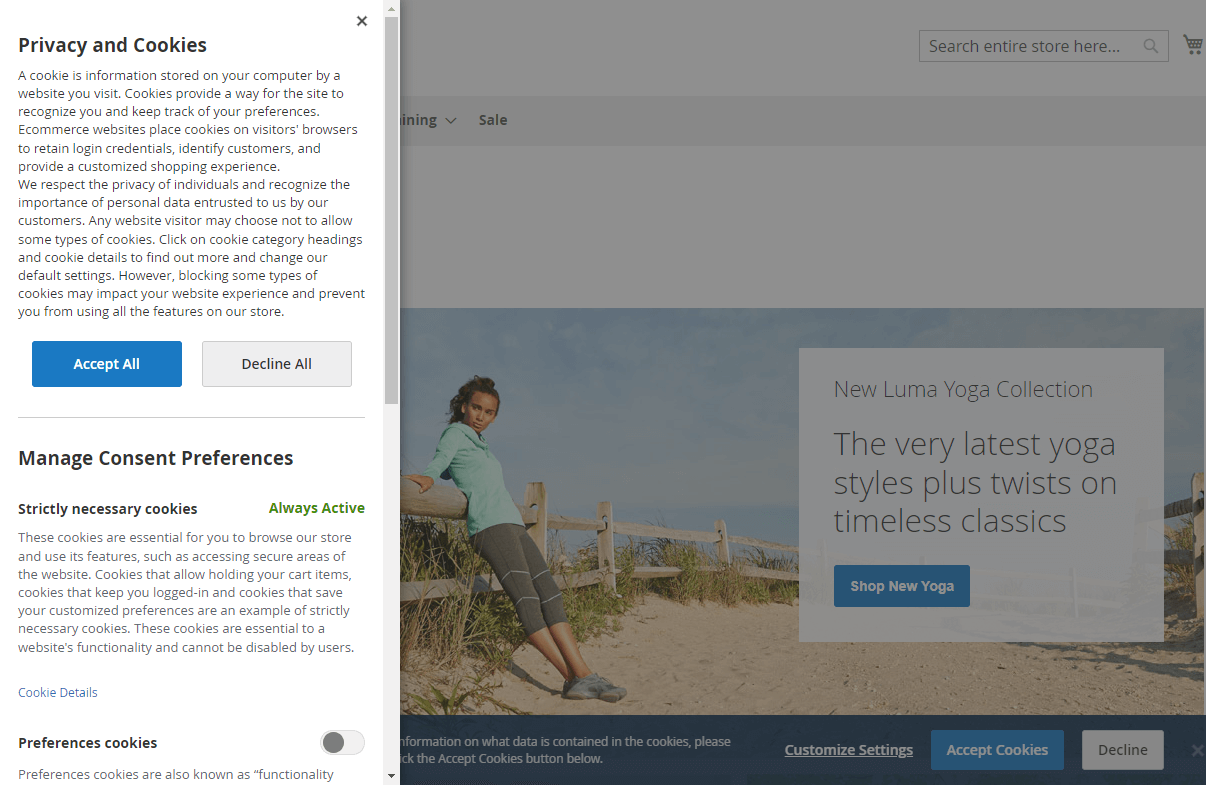Magento 2 Cookie Notice: Everything You Need to Know
Cookies are playing a key role in enhancing user experience and providing personalized content in today’s digital landscape. However, you must inform visitors about the use of cookies on your website and obtain their consent to this effect as required by the Cookie Law. You will find everything you need to know about cookies and cookie notices and discover the process of adding a cookie notice to Magento 2 websites with the Magento 2 Cookie Notice extension from Plumrocket.
What Are Cookies?
Cookies are small text files that websites create and store on a user’s device when they visit a website. Cookies are designed to store information about users and their browsing activity and identify them on the next visit.
It’s important to know that cookies can be categorized as first-party or third-party. First-party cookies are set by the visited website and are used primarily for site functionality. In contrast, third-party cookies are set by external websites or services embedded in the page, such as advertisements or social media plugins.
Cookies are commonly used for various purposes, such as:
- Session Management: Cookies are used by websites to remember some information about a user’s session. They can, for instance, store items in a shopping cart and keep users logged on without requiring multiple credentials.
- Personalization: In order to enable a tailored web experience, websites use cookies to remember the user’s preferences and settings. For example, users will be able to see content that matches their interests or view the website in the language that was selected earlier.
- Tracking and Analytics: Some types of cookies can collect information about how users interact with a website. This data helps website owners understand user behavior, improve their site’s performance, and provide targeted advertisements.
- Advertising: Third-party cookies used for advertising purposes can track users across multiple websites. This way, advertisers are able to display personalized ads depending on the user’s browsing history and interests.
How Do Cookies Work?
Cookies work by storing small pieces of data on a user’s device to recognize users on the next visits and provide a personalized browsing experience. On the first visit to a website, it sends a cookie file to the user’s browser, which then stores it on the device. On the next visit to the same website, the browser sends the cookie back to the website, allowing it to recognize the user and provide a personalized experience.

Does My Website Require Cookie Notice?
The use of cookies is subject to data protection and privacy legislation in a wide range of countries, such as the European Union. The EU’s General Data Protection Regulation (GDPR), for example, requires website owners to obtain user consent before placing non-essential cookies on their devices.
A number of factors will determine whether or not it is necessary to provide a cookie notice, such as the types of cookies that are used by your website and the laws at issue in relation to this jurisdiction. Here are a few points to consider:
- Legal requirements: Before determining if you have to provide the cookie notification, review laws and regulations in your country or region. In some cases, you may be required to obtain user consent before placing certain types of cookies.
- Use of cookies: Use of cookies: Think about the purpose and functionality of the cookies that are being used on your website. Generally, it is good practice to inform users of the use of cookies if your Web site has a significant amount of cookie usage, in particular for eCommerce features such as shopping carts and user preferences or Analytics.
- Non-essential cookies: This is the type of cookie you do not strictly need for your fundamental website functioning. For example, tracking cookies that are used for the purpose of marketing or advertising. A user’s permission to place no essential cookies is often requested before such cookies can be placed.
Cookies have raised privacy concerns, especially regarding tracking and targeted advertising. And therefore, providing transparent information about your use of cookies and obtaining user consent is generally considered a good practice. Even if your website does not require a cookie notice by law, you will show respect for user privacy and build trust.
How Plumrocket Helps You Add Magento 2 Cookie Notice
Plumrocket’s Magento 2 Cookie Notice extension provides a comprehensive solution for displaying a cookie consent notice on your Magento-powered website. This extension provides you with an easy way to meet the cookie consent requirements for GDPR, CCPA, LGPD, and other data privacy laws by displaying a customizable and user-friendly cookie notice banner.

Additionally, when users click “Customize Settings”, they can conveniently manage their consent by enabling/disabling specific cookie categories. For example, they can disable the “Marketing” category and continue shopping without any privacy concerns.

Here’s how you can benefit from Magento 2 Cookie Notice from Plumrocket:
- Customizable Cookie Notice: The extension allows you to design and customize the cookie notice to match your website’s branding and style. You can choose from different layouts, colors, fonts, and position options to create a cookie notice that aligns with your website’s design.
- Cookie Consent Management: The extension provides a user-friendly interface that allows you to manage and categorize cookies on your website, which is required by some data privacy laws. You can create different cookie groups, such as essential, functional, analytical, or marketing cookies, and define their purposes.
- Cookie Blocking Options: With Magento 2 Cookie Notice, you can give your visitors control over their cookie preferences. They can choose to accept or reject specific cookie categories, giving them more control over their privacy and data.
- Cookie Policy Page: The extension automatically generates a cookie policy page for your website, which includes detailed information about the types of cookies used and their purposes. This helps you meet the GDPR requirement of providing clear and comprehensive information about cookies to your visitors.
- Show Magento Cookie Notice By Country: In the extension’s configuration, you can enable a geo-targeting feature by selecting the countries where to show a cookie notice for customers. This is especially useful when you primarily sell products in your country but need to collect consents from EU customers to comply with the GDPR data privacy law.
- Compatibility and Support: Plumrocket’s extensions are built to work seamlessly with Magento, ensuring compatibility and stability. They also provide support and regular updates to address any issues and keep the extension up to date with the latest Magento versions and data privacy law regulations.
Conclusion
By using Plumrocket’s Magento 2 Cookie Notice, you can streamline the process of implementing a cookie consent notice on your Magento store, ensuring compliance with GDPR and other data protection regulations. This extension not only simplifies the technical aspects but also enhances user experience by providing clear information and control over cookie usage.




